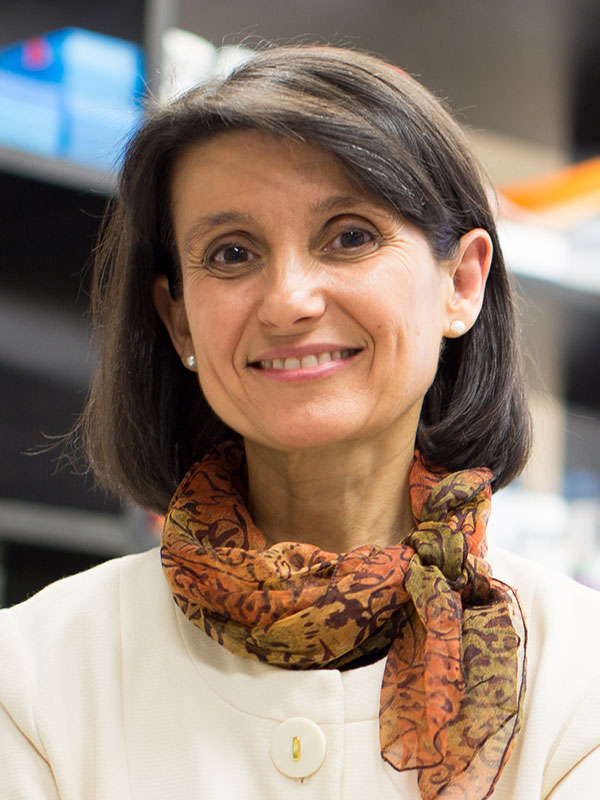 Ana Maria Cuervo, M.D., Ph.D.
Ana Maria Cuervo, M.D., Ph.D.
Professor, Departments of Developmental & Molecular Biology, Anatomy & Structural Biology, and Medicine (Gastroenterology & Liver Diseases)
Dr. Cuervo is co-director of the Einstein Institute for Aging Research, and a member
of the Einstein Liver Research Center and Cancer Center. In 2001 she started her
laboratory at Einstein, where she studies the role of protein degradation in aging and
age-related disorders, with emphasis in neurodegeneration and metabolic disorders. full bio
Key Publications
- Orenstein SJ, Kuo SH, Tasset-Cuevas I, Arias E, Koga H, Fernandez-Carasa I, Cortes,
E., Honig, L.S., Dauer, W., Consiglio A, Raya A, Sulzer, D, Cuervo AM*. Interplay of
LRRK2 with chaperone-mediated autophagy. Nat. Neurosci. 16:394-406, 2013.
- Anguiano J, Gaerner T, Daas B, Gavathiotis E, Cuervo AM*. Chemical modulation of
Chaperone-mediated autophagy by novel retinoic acid derivatives. Nat. Chem. Biol.
9:374-82, 2013.
- Pampliega O, Orhon I, Patel B, Sridhar S, Diaz-Carretero A, Beau I, Codogno P, Satir
B, Satir P, Cuervo AM* Functional interaction between autophagy and ciliogenesis.
Nature 502:194-200, 2013.
- Bejarano, E, Yuste, A, Patel B, Stout, RJ, Spary, D Cuervo AM*. Connexins modulate
autophagosome biogenesis. Nat. Cell. Biol. 16:401-14, 2014.
- Schneider JL, Suh Y, Cuervo AM*. Deficient chaperone-mediated autophagy in liver
leads to metabolic disregulation. Cell Metab. 20:417-432, 2014.
Funding
- 5 R01 AG21904-11 Cuervo (PI) 04/15/2003-03/31/2023 (merit award)
NIN/NIA $217,119 3.4 cal. months
Decreased Protein Degradation in Aging
The main goals of this project are: 1) To identify the reason for the decrease in the levels of the lysosomal
receptor for chaperone-mediated autophagy with age; 2) To determine direct cellular consequences of the
decline in chaperone-mediated autophagy with age; 3) To evaluate the effect of correcting the already
identified age-related defect in chaperone-mediated autophagy.
Role: Principal Investigator
- P01 AG031782-06 Cuervo (PI) 2/15/09-4/30/19
NIH/NIA $1,194,837 3.00 cal. months
Functional Consequences of Impaired Autophagy in Aging
The goal of this program project is to investigate the role that age-related changes in autophagy play in the
functional alterations and inefficient response to immunological challenges and to stress of old organisms.
This Program Project groups the expertise of four investigators interested in immunosenescence, lipid
metabolism and autophagy and the stress response.
Role: PI Program Project and Leader project 1
- R01 DK098408-02 Cuervo, Wolkoff (MPI) 04/01/13-03/31/18
NIH/NIDKK $431,100 1.7 cal. months
Liver Cell Membrane Protein-Expression and Function
The goal of our project is to identify the effect that changes in autophagy have in the endocytic pathway and to
determine whether specialized lysosomes participate in each of these processes and in the different types of
autophagy or whether the same group of lysosomes have multifunctional abilities.
Role: co-PI
- 5P01 AG017617-10 Nixon (PI) 09/30/11-08/31/16
NIH/NIA $32,516 0.3 cal. months
Cell and molecular pathobiology of Alzheimer’s disease
The goal of our subproject is to test the role that altered autophagy plays in the ethiopathogenesis of different
forms of Alzheimer’s Disease.
Role: Collaborator (subcontract)
- ADA 1-15-MI-03 1/01/2015-12/31/2017 0.0 cal. months
American Diabetes Association
Interplay of chaperone-mediated autophagy with lipid metabolism and ER stress
$39,633/year
Goal: This award supports the salary of a post-doctoral fellow in our lab interested in the relation between autophagy and lipid metabolism. This work intends to understand how autophagy, one of the basic systems that control metabolism in the cell, normally protects different organs against nutritional transgressions and how the gradual decrease in its function with age makes old organisms vulnerable to these nutritional insults and disease.
Role: Principal Investigator/Mentor